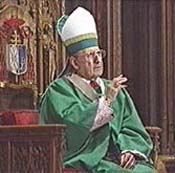 for Catholic Vote Oral Majority Protests Bush Today at St. Patrick's Cathedral Late Cardinal O'Connor Receiving Congressional Gold Medal |
|
By Bill Berkowitz
Later this month, Bush will be meeting with the Pope at the Vatican. These events, and dozens of similar ones, indicate the Republican Party's current campaign courting Catholics is in full swing. There are more than 60 million Catholics in the U.S. About 45% of them are registered to vote. Although George W. Bush received only 47% of the total Catholic vote, he won 55% of the vote of Catholics who are most active in church activities. Former Republican Party national chairman Jim Nicholson believes that the Catholic vote was decisive in several states where the president won by a narrow margin. In many swing states, the Catholic vote is up for grabs. The Republican Party is doing something about it. On May 20, Mr. Bush gave the first commencement speech of his presidential career at Notre Dame University. He told no self-deprecating jokes and his appearance wasn't belated pay back for his ill-advised speech at Bob Jones University during the Republican Party primaries, nor a return to the roots of win-one-for-the-Gipper nostalgia. Instead, the president was looking for support for his faith-based initiative. The subtext of the event was summed up by conservative columnist John Fund, who, on CNBC's Hardball, called the speech a "serious attempt" to go after the Catholic vote. Deal Hudson, longtime conservative activist and publisher of the conservative Catholic magazine, Crisis, sees Bush's recent activities as an "acceleration" of the president's Catholic strategy. Hudson, recently appointed the GOP's new national chairman for Catholic outreach noted, in his column in the May 2001 issue of Crisis, that Mr. Bush had already met with several bishops and other church officials around the country. On March 16, Mr. Bush celebrated St. Patrick's Day with Irish-American leaders and some key players in the Northern Ireland peace process. He also took time for dedication ceremonies at the newly created John Paul II Cultural Center in Washington, D.C. "This nation's evangelical leaders have successfully shaped a voting block with real power to deliver votes and affect policy," Hudson declared. "Bush's determination to connect with Catholics provides them an opportunity to have similar clout. The political door is open, but whether Catholics, both religious and lay, will seize this moment remains to be seen."
Over the past twenty years there have been a number of attempts to bring observant Catholics over to supporting conservative candidates and core issues. The most successful of these efforts has now reached almost legendary status - the conversion of large numbers white working class voters from loyalist Democrats to Reagan-Democrats. In the past, evangelical and fundamentalist Protestants often headed up these efforts, inflaming long-standing disagreements and antagonizing Catholic officials. These days, it's not evangelical Protestants leading the way. Instead, there's a group of politically savvy conservative Catholics, who over the years have grown comfortable working with conservative Protestants. They have their organizational acumen and strong financial backing to found the National Catholic Leadership Forum (NCLF). NCLF had its official coming out party at a late-April meeting in Washington, DC. It aims to "encourage 'team leaders' to introduce Mass-attending Catholics to the Republican Party." Deal Hudson, who converted to Catholicism from being a Baptist minister, rallied the troops, telling them that the "time for talk is over. The time to organize Catholics behind the party of life - that time has begun." In "Social Renewal Catholic," an article in the June 1999 issue of Crisis, Wagner describes two types of American Catholics. The first group, "Social-Justice Catholics," support activist government, multiculturalism, self-identify as liberal, and are critical of America's minimal efforts on behalf of the poor and minorities. The second group is made up of "Social Renewal Catholics," who "reject the social-justice agenda," believe in "an absolute standard of morality," thinks the government is "exacerbating" the decline in individual morality, and sees "popular culture as undermining the character of our youth." The latter vastly outnumber the former. A QEV-conducted national survey of 1,001 individuals found 62 percent supporting the social renewal position while only 35 percent supported the social-justice view. You can add an unswerving faith in free markets to the profile of "social renewal Catholics" - a faith best exemplified by such new conservative Catholic spokesmen as Father Robert Sirico, founder of the Acton Institute. The stakes are high and the GOP is getting prepared for its ambitious Catholic recruitment tour. With Hudson heading up its Catholic outreach project, the newly formed National Catholic Leadership Forum in place, and Mr. Bush ready and willing to schmooze, it's Onward Catholic Soldiers. |


